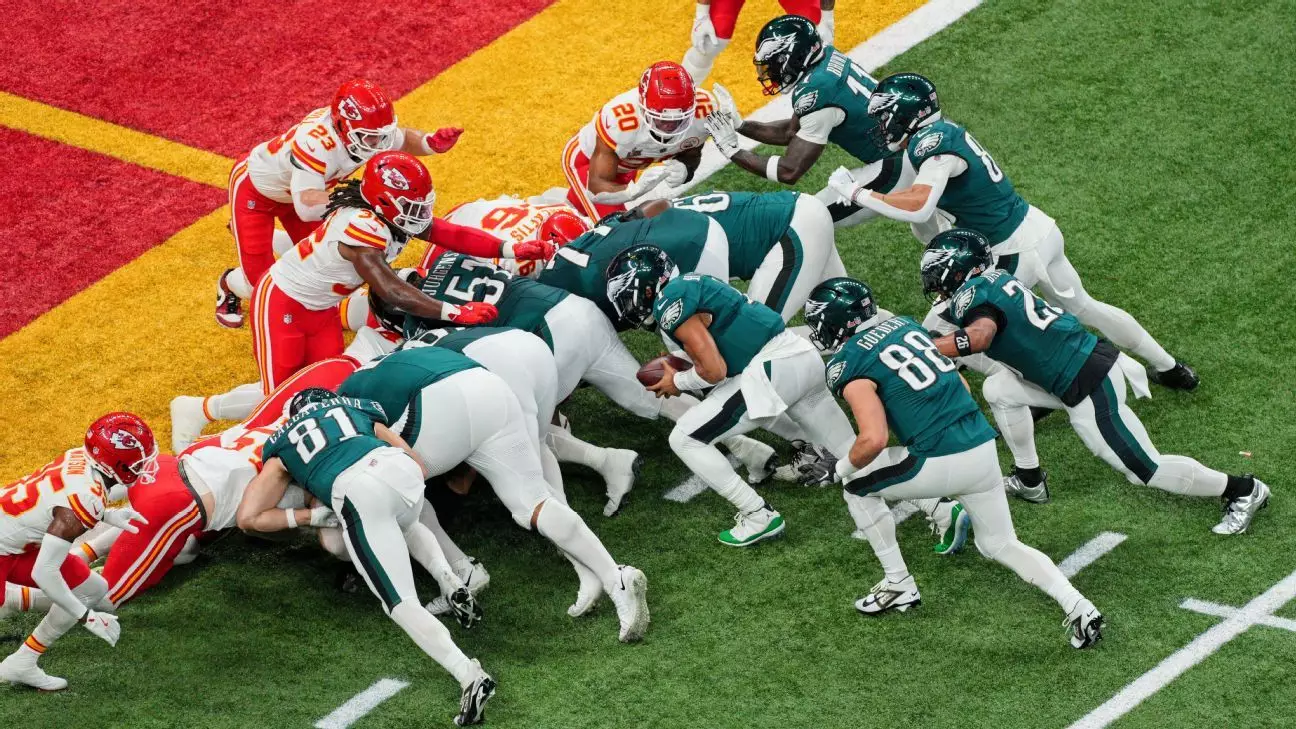The National Football League (NFL) is no stranger to rule changes, and the latest proposal aimed at banning the “tush push” quarterback sneak has generated significant discussions in football circles. During a recent press conference at the scouting combine, Troy Vincent, the NFL’s executive vice president of football operations, revealed that a team has officially proposed the ban. While the specific team behind the proposal remains undisclosed, this request underscores the ongoing evolution of the game and the need to adapt rules according to player safety and competitive balance.
The proposal represents a critical moment for the NFL, as it aims to address concerns about the effectiveness and safety of this particular play. Historically, the “tush push” involves lining up one or more players behind the quarterback, forcing the defense to anticipate a formidable push forward. Reports indicate that the play has been executed with remarkable success by certain teams, leading to both touchdowns and first downs at a significantly higher rate than the rest of the league.
Over the past three seasons, the Philadelphia Eagles and Buffalo Bills have combined for an impressive 163 successful tush push plays. According to ESPN Research, these two teams have converted this play into touchdowns or first downs an astonishing 87% of the time. In stark contrast, the average success rate across the rest of the league stands at just 71%. This stark disparity highlights the effectiveness of the “tush push” when executed by skilled players.
One of the most notable instances where the “tush push” proved decisive was during Super Bowl LIX, where Jalen Hurts of the Philadelphia Eagles scored a crucial touchdown using this tactic. The play’s success has prompted other teams to consider adopting similar strategies, but with mixed results. Moreover, the NFC Championship Game featured a compelling moment when Washington Commanders linebacker Frankie Luvu faced multiple penalties while trying to counter the Eagles’ effective usage of the “tush push.” This incident further underscores the play’s ability to disrupt conventional defensive strategies.
As the proposal moves towards a potential vote at the upcoming spring owners’ meeting in Palm Beach, Florida, the debate surrounding the “tush push” brings up salient points about player safety and the nature of competitive fairness in the league. Coaches like Nick Sirianni of the Eagles possess a vested interest in maintaining the current rules, arguing that it would be unjust to penalize teams for executing a play successfully. The success of the Eagles in this domain showcases their skills, and any proposed rule change could diminish their strategic advantages.
In his remarks, Vincent emphasized that the issue of the “tush push” needs closer examination. His previous mention of discussing the hip-drop tackle, another controversial play, suggests a broader concern about the evolving nature of tackles and sneaks in the league. Vincent’s statements signal that this proposal may encompass not just the tactics of the Eagles but also the long-term ramifications on both offensive and defensive formations across the league.
If the proposal to ban the “tush push” is to pass, it will require a two-thirds majority from the NFL’s 32 team owners—namely, 24 votes in favor. Historically, rule changes have often faced fervent debate, reflecting the diverse styles and strategies employed by teams. The outcome of this vote will likely have implications for how teams approach short-yardage situations moving forward, and it could shift the balance of power in the league.
The NFL’s dynamic nature leaves plenty of room for interpretation and change, but as discussions surrounding the “tush push” unfold, one thing is clear: Every rule has its defenders and detractors. The conversation surrounding this play highlights the essential elements of strategy, safety, and competition that contribute to the ongoing development of professional football. Regardless of the outcome, the significance of this issue will undoubtedly influence how teams prepare for future seasons.

